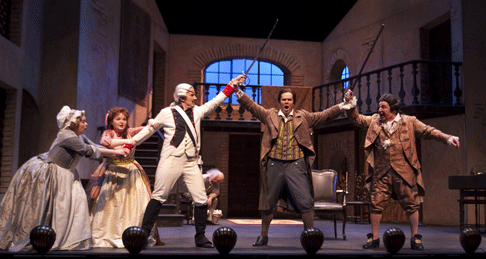27 Apr 2010
Il barbiere di Siviglia, Arizona Opera
The story of Gioachino Rossini’s Il barbiere di Siviglia (The Barber of Seville) is based on Pierre-Augustin Caron de Beaumarchais’ 1775 play, Le barbier de Séville.

The story of Gioachino Rossini’s Il barbiere di Siviglia (The Barber of Seville) is based on Pierre-Augustin Caron de Beaumarchais’ 1775 play, Le barbier de Séville.
It is the first play of a trilogy that includes La folle journée ou Le mariage de Figaro, which was made into the opera Le nozze di Figaro by Mozart, and La mère coupable, which was set by Corigliano as The Ghosts of Versailles. Over the years, various composers of operas and singspiels have used it as the basis of their compositions. Ludwig Benda and Johann André wrote music to it in 1776. Johann Elsperger based a singspiel on it in 1780. Composer Giovanni Paisiello and librettist Giuseppe Petrosellini made Le barbier into an opera and it appeared first in Russian translation at the imperial court of St. Petersburg in 1782.
In 1783, The Barber’s story appeared as Die unnützige Vorsicht, a translation of the subtitle, The Useless Precaution. In 1794, The Spanish Barber by British born composer Alexander Reinagle was sung across the ocean in the brand new United States. It is said to have been a favorite of George Washington. In 1796, Nicolas Isouard, an organist from Malta who had moved to Paris to compose, set the story to music and it was presented at the Opéra Comique. When Rossini and librettist Cesare Sterbini chose that story and premiered their opera in 1816, Paisiello’s fans heckled the performance. At the second performance, however, the audience realized that Rossini’s version was well worth hearing, and from then on it became at least as popular as Paisiello’s work, which was also played for many years.
On April 24, Arizona Opera presented the last opera of its 2009-2010 season, a rousing rendition of Gioachino Rossini’s The Barber of Seville, at Phoenix Symphony Hall. The traditional production was by Bernard Uzan with detailed and functional sets by David Gano. The costumes by Anna Bjornsdotter were flattering to the artists as well as correct for the time and place. With Artistic Director Joel Revzen in the pit with the excellent Arizona Opera Orchestra, everything was ready for a fine performance. The overture was played with clarity and translucence. It seemed that the players could go as fast as the wind and still play each note precisely.
Unfortunately, after the overture, and while the tenor was singing his most difficult first aria, ushers allowed latecomers into the hall and accompanied them with flashlight beams and whispers.
Tall, good-looking Brian Stucki is a wonderful new coloratura tenor who can sing the most graceful lines of Almaviva’s music in correct style. A good actor, he has all the essentials for comedic timing. As Rosina, Elizabeth DeShong sang with honeyed tones and quite a powerful voice. She also let the audience know from the beginning that she was not about to submissively obey her guardian, Dr Bartolo.
 Elizabeth DeShong as Rosina, Peter Strummer as Bartolo and Joshua Hopkins as Figaro
Elizabeth DeShong as Rosina, Peter Strummer as Bartolo and Joshua Hopkins as Figaro
This was Joshua Hopkins’s first Figaro, but no one would have known it from his performance. He was an authoritative barber who sang with robust sounds and had both vocal and stage tricks up his sleeve. Bass-baritone Peter Strummer was thoroughly amusing as the self-righteous Dr Bartolo. His slow tones had polish. His patter was understandable and secure. As the conspiratorial Don Basilio, Kurt Link did not wear the traditional hat, but he was a great comic villain whose voice was redolent with colorful deep tones.
Grace Brooks was a Berta who thought both Dr Bartolo and Rosina were crazy. She is still in the AZ Opera Young Artist Program, but she is fast becoming a finished singer and her aria was a delight to hear. Although John Fulton did not have an aria, he portrayed both Fiorello and the Sergeant with thoughtful consideration of their situations.
The all male chorus led by Julian Reed sang with gusto and harmonized accurately. Reed also played the beautifully modulated recitatives on the harpsichord. This was a hilariously funny show and the laughter almost drowned out some of the music, but the Barber is a true comedy and it was good to see it so well appreciated by the Arizona audience.
Maria Nockin